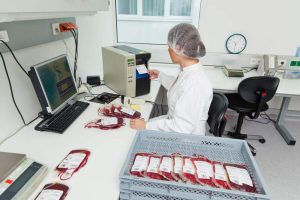
Injecting stem cells may reverse damaged caused by diabetic neuropathy
A study shows that injections of stem cells may one day reverse the damage caused by diabetic neuropathy.
Diabetic neuropathy is a complication from diabetes mellitus in which the nerves are damaged by prolonged exposure to high blood glucose levels, and affects up to 50% of patients with diabetes. Higher risk is associated with patients who have poor control of blood sugar, who are overweight, have higher levels of blood fat and high blood pressure, and are over the age of 40. Symptoms include numbness, tingling, pain, wasting of muscles in the extremities, or digestive or urinary problems. In some cases, the feet can become ulcerated and could require amputation.
In this study, published in the online edition of Cell Transplantation, scientists injected a type of stem cell known as mesenchymal stem cells (MSCs) into the hind limbs of rats with a form of diabetes. Untreated, the rats develop signs of diabetic neuropathy, including loss of capillaries (small blood vessels), degeneration of nerve cells, loss of myelin (a coating on nerve cells necessary for conduction of nerve signals), and reduced conduction speed of nerve signals.
The scientists showed that the MSCs injected into the limbs migrated to the nerves, and that nerve conduction speeds were restored to near-normal levels. Further examination showed that the stem cell treatment led to growth of new capillaries around the nerves, restoration of nerve cells, and increased myelin surrounding the nerves.
According to the authors, this is the first study to show that MSCs injected into muscle tissue can migrate to the nerves and address nerve damage associated with diabetic neuropathy. Present treatments are aimed at tightly controlling blood sugar levels and alleviating pain, but there is no cure and the damage to nerves is generally progressive.
If translated to humans, the stem cell therapy could potentially halt or even reverse the nerve damage caused by diabetic neuropathy.
Further Information:
Han, JW, Choi, D, Lee, ML, et al. (2015) Bone marrow-derived mesenchymal stem cells improve diabetic neuropathy by direct modulation of both angiogenesis and myelination in peripheral nerves. Cell Transplantation. 25(2): 313-326. doi: 10.3727/096368915X688209
相关文章

Sibling cord blood tested for treating cerebral palsy in young children









